- Home
- Maggie Stiefvater
Call Down the Hawk: The Dreamer Trilogy Page 4
Call Down the Hawk: The Dreamer Trilogy Read online
Page 4
“Repo! You’re supposed to say Repo.”
“What?” Ronan was playing a card game. It was a confusing card game, with a lot of rules, an elaborate setup, and an unclear time frame for completing gameplay. He was fairly certain it had been developed by students at Harvard. He was fairly certain, in fact, that it had been developed by the students at Harvard he currently sat with: Fletcher, Eliot, Gillian, and Benjy. Adam sat beside him, hearing ear closest (he was deaf in one).
Beneath the table, Adam’s shoe was pressed hard up against Ronan’s.
Eliot explained, “To notify the other players.”
“Of what?”
Eliot flinched at his tone, although Ronan hadn’t thought he’d been any more terse than usual. Possibly his usual was enough. The first thing breezy Eliot had said when they met Ronan was “Oh, you’re scarier than I expected!”
Fucking nice to meet you, too, Ronan had thought.
The game unrolled at a table in the basement common room of Thayer. Other students played pool, gathered around TVs and laptops, and listened to music. It smelled like garlic and take-out food. The brick arches holding up the ceiling gave the entire space the vibe of either a wine cellar or catacombs. It all felt like a secret club.
Gillian, who wore a tie knotted with more certainty and polish than Ronan ever had, shook her cards at him. “You say ‘Repo’ unto them so they can assess the suit and color of your lot and form a strategy to hopefully stop you from repo’ing the last card you need to win.”
Ronan looked at the cards he’d already laid out on the table. “I only need one more?”
“He’s a savant,” said Fletcher, whose great, round expanse was held in by a snazzy sweater vest. He seemed as if he ought to be smoking a cigar or backing slowly into the black-and-white photo he had emerged from. “He’s a savant and he doesn’t know it. The beautiful girl who doesn’t know her beauty. The brute who doesn’t know his strength. Twenty’s what you need. Twenty in your lot, and you’re the boss, game over. And you, my friend, have nineteen.”
“H-E-double boomerang,” said Benjy softly, with feeling. He had only two cards in his lot.
“But you could be put off,” Gillian explained. “Adam, for instance, could pay his bill with his spades. He could put them all in the bank, and then you wouldn’t be able to complete the spades in your lot with his cards.”
Beneath the table, Adam pressed the rest of his leg up against Ronan’s, his expression unchanging as he did.
This card game, Ronan thought, was going on forever.
“But if Adam pays spades, then he wouldn’t be able to complete his own lot with spades,” Fletcher interjected in his plummy voice. “Technically, yes, but not practically. Paying spades would be on his record for ten more turns, so he couldn’t play spades until after that. At this stage in the game, someone else will have won before he frees up spades for himself again.”
“That’s heavy,” Ronan said.
“Poverty sucks,” Fletcher mused, smoothing his sweater.
“Anecdotally,” Gillian said wryly.
Ronan shot a glance at Adam. Adam, who’d grown up in a trailer; Adam, who even now wore that secondhand tweed vest Gansey’s father had given him years ago; Adam, who had never spared words about the entitled students at the private school he’d worked three jobs to attend.
But Adam just tilted his cards toward his chest so the others couldn’t see his hand anymore.
“Well, fucking Repo, then,” Ronan said.
Gillian played a joker next to Ronan’s lot. “I’m parking you in.”
“Noble,” whispered Benjy.
“Write it on my grave,” she said.
As the others took another round of turns, skipping both Ronan and Gillian because of her sacrificial move, Ronan stared around the common room and tried to imagine spending time here regularly. He hadn’t told Adam about the appointments yet. It wasn’t a conversation he wanted to have in front of everyone here; they wouldn’t understand why it was even a decision. To the outside eye, there was no reason why Ronan shouldn’t move: his parents were dead, he had no job, he wasn’t going to college, and the Barns could run wild and unattended until he returned to visit his brothers for holidays.
To the outside eye, Ronan Lynch was a loser.
“Hey, Scary,” said Eliot. “Scary Spice.”
“Lynch, it’s your turn,” added Adam.
Ronan cast an appraising look over the table. Picking up Gillian’s joker, he added the four other jokers he’d collected over the course of the game, and put the five matching cards down in the center of the table.
“This is how this works, right?” he asked as he plucked a king of hearts out of Fletcher’s lot to add to his own lot of nineteen cards he’d assembled in front of him, making it an even twenty.
“God, it is, God, I hate you,” Fletcher moaned operatically.
“Who are you to come to our lands and take our women,” murmured Gillian.
“We don’t like your boyfriend, Adam,” Benjy said.
Adam just smiled a private smile as he deftly swept his cards into a stack. “I’m taking the winner away, you guys.”
“Wait,” Gillian said. “You and I should talk to Yanbin before you go.”
“Just a second,” Adam told Ronan. Leaning in close, he added, “Don’t kill anyone.” The words were only an excuse to breathe in Ronan’s ear; it made a marvel of his nerve endings.
Ronan was left facing Adam’s remaining friends. He didn’t know how good of friends they were. Not good enough to come up in phone conversations more than Gansey and Blue, but good enough that they could claim a game of Repo before Ronan got Adam to himself. They weren’t what he expected. Aglionby had been a private boarding school, and he’d expected Harvard kids to be some unpleasant variation of the Aglionbros. But Adam’s friends were not remotely the same species. They were not even the same species as each other; they were peculiar, distinct individuals. They were also more openly and gleefully queer than any Aglionby student Ronan had ever met. Ronan, who’d spent most of his high school years assuming other people were rich assholes and being the only gay person he knew, found these developments somewhat unsettling.
It was not that he thought Adam would replace him. It was just that now he saw precisely what Adam could replace him with.
“So where’d he find you crying?” Benjy murmured.
Ronan thought he’d misheard him. “What?”
Eliot said, “When you met. Where were you crying?”
Their words clarified nothing. Ronan couldn’t imagine why they would have thought him a crier, period. The last time Ronan had cried had been over the memory of his dreamed mother, who had been eviscerated while a magical forest he adored was similarly dismantled around her. It seemed unlikely Adam would have told strangers any part of that, but the idea of it nonetheless sent an unpleasant warmth through his chest. Maybe Adam had told an untrue story of how they’d met. Also unpleasant to consider.
Fletcher seemed to read Ronan’s face, because he patted his ample tummy fondly before rumbling, “So he didn’t always collect criers, then. You’re pre-crying.”
“Maybe he doesn’t date criers,” Eliot pointed out.
“You’re going to have to back this truck up,” Ronan said.
“We’re the Crying Club,” Benjy explained. “We were all criers.”
“Adam Parrish and the Crying Club, like a band,” Fletcher said. “He has a nose for us. Like a superhero. Somewhere on the Harvard campus someone is hidden in a stairwell crying right now, and Adam is on his way to find them and comfort them and give them someone to play cards with on a Friday night.”
Ronan spent a fraught few seconds trying to reconcile the standoffish Adam he knew with this description. The Adam he knew was a silent observer. A cataloguer of the human experience. A look don’t touch. The idea of him being something else, something Ronan didn’t know, felt as unsettling as realizing that Adam’s new friends weren’t awfu
l. He and Adam had been making the same memories for so long that he’d forgotten that it didn’t always have to be like that. Adam was here having a new life, becoming a new person, growing from something beaten down into whoever he was meant to be. And Ronan was … Ronan. Still hidden away in the foothills of Virginia. Dropped out of school. Living in the place he’d been born. Keeping his head down so he could stay alive. Making the same memories he’d been making for months.
Adam was changing. Ronan couldn’t.
He was moving here, he thought. It would work.
Ronan snarled, “Yeah, he’s always been a regular Florence Nightingale.”
“They say opposites attract,” Eliot said. They took a photo of Ronan’s winning lot and put their head down to text it to someone.
“That’s me,” Ronan said. “He saves people; I take their lunch money.”
Benjy had stopped collecting cards and instead pensively eyed the stack he’d made. In his small voice, he said, “I envy him. I wish I had his family.”
Eliot’s fingers paused in their texting. “Yeah. I wish my dad could meet his dad. I hate my father.”
Record scratch, freeze-frame, stop the press.
“He has such wonderful Southern family stories,” Fletcher said grandly. “He’s like Twain without the racism. His words, the gravy, our ears, the biscuits.”
Once upon a time, Ronan Lynch had punched Adam Parrish’s father in front of the Parrish trailer. Once upon a time, Ronan Lynch had been there when Adam Parrish’s father had beaten the hearing out of his left ear for good. Once upon a time, Ronan Lynch had helped move Adam Parrish’s stuff into a shitty rented room so that he wouldn’t have to live with his parents ever again.
Ronan felt as if he was blinking around in a dream. Everything subtly incorrect.
He was still staring at the Crying Club when Adam reappeared.
“You ready?” Adam asked.
“It was nice to meet you, Ronan Lynch.” Fletcher held his hand out across the table.
Ronan hesitated, still off balance. Then he knocked Fletcher’s hand sideways so he could bump knuckles instead. “Yeah.”
“Don’t be a stranger,” Eliot said.
“Buh-bye,” added Benjy.
“Fuck off,” Gillian said kindly.
As they walked away, Ronan heard Fletcher say, “That man is very fetch.”
They pushed out of the common room; Adam reached between them to take Ronan’s hand. They climbed the stairs; Ronan disentangled their fingers and instead put his arm round Adam so that they climbed hip-to-hip. They stepped into Adam’s room; they made it no farther. In the dark, they tangled in each other for several minutes, and finally broke off when stubble had made lips sore.
“I missed you,” Adam said, voice muffled, face pressed against Ronan’s neck.
For a long moment, Ronan didn’t reply. It was too ideal; he didn’t want to ruin it. The bed was right there; Adam felt warm and familiar; he longed for him even while holding him.
But then he said, “Why did you lie to them?”
It was difficult to ascertain how he knew Adam reacted, since he didn’t reply or move, but Ronan nonetheless felt it.
“The Crying Club,” Ronan added. “Don’t tell me you didn’t.”
Adam stepped away. Even in the dark, Ronan could see that his expression looked more like the Adam that Ronan had known for years. Guarded.
“I didn’t really,” Adam said.
“Like hell you didn’t. They think your father—I don’t even want to fucking call him that—is some kind of saint.”
Adam just held his gaze.
“What are you playing at, Adam?” Ronan asked. “You sitting there at that table with a bunch of rich kids playing a card game where the punch line’s poverty, pretending you left some Brady Bunch bull back home?”
He could remember it like it had happened yesterday. No, like it had happened minutes ago. No, like it was still happening, always happening, kept fresh in a perfect, savage memory: Adam on his hands and knees outside the trailer, swaying, disoriented, broken, the light from the porch cut into fragments by his strange shadow. His father standing over him, trying to convince Adam it was his fault, always his fault. At the time it had only flooded Ronan with boiling, bursting, non-negotiable rage. But now it made him feel sick.
“Is it so bad?” Adam asked. “Is it so bad to start over? Nobody knows me here. I don’t have to be the kid from the trailer park or the kid whose dad beats him. Nobody has to feel sorry for me or judge me. I can just be me.”
“That’s some pretty fucked-up shit.” As Ronan’s eyes got used to the dark, he saw Adam’s profile clearly against the dull blue Cambridge night outside the dorm windows. Furrowed brow, lips tight. Pained. Old Adam. Adam from before graduation, before summer. Perfectly and depressingly recognizable, unlike that elegantly coiffed one on the walkway.
“You wouldn’t get it.”
This was too much; Adam wasn’t allowed ownership of hardship. Ronan growled, “I’m gonna start telling people my parents are still alive. I don’t want everyone to think of me as that orphan from now on.”
“This is what I got. You have your brothers. I’ve got no one, okay?” Adam said. “Leave me alone, because you have no idea.”
His voice hitched on because.
And like that, the fight was over. It had never been a fight between them, anyway. For Adam, it was what it always was: a fight between Adam and himself, between Adam and the world. For Ronan, it was what it always was, too: a fight between truth and compromise, between the black and white he saw and the reality everyone else experienced.
They knotted back together and stood there, eyes closed. Ronan put his lips on Adam’s deaf ear, and he hated Adam’s father, and then he said it out loud: “I’m looking at apartments. Tomorrow.”
For a breath, he was worried Adam no longer wanted a version of Ronan who could come stay with him in Cambridge, but then Adam said, “Don’t just say that. Don’t just throw it out. I can’t …”
“I’m not just saying it. Declan’s here. Matthew. They drove me up. I had to be in the Volvo for, like, eight hours. We have—I’ve got—appointments and shit. Tours. To see them. To pick one. You can come with if you aren’t doing your Harvard parade. It’s all set up.”
Adam pulled away again, but this time his expression was quite different. This was neither old-old Adam nor new-polished Adam. This was the Adam who’d spent the last year at the Barns, a complicated Adam who didn’t try to hide or reconcile all the complex truths inside himself, who just was. “How would that work?”
“I can control it.”
“Can you?”
“I stay at Declan’s all the time.” Ronan didn’t get much sleep there, but the statement was still true.
“And what about your face? The … nightwash. What about that?”
“I’ll go out of town every weekend to dream. I’ll find some-place safe.”
Adam said, “What about …” but he didn’t add anything else. He just frowned more deeply than he had during the entire exchange, his mouth all crumpled with consternation.
“What’s the face for?”
“I want it too much,” Adam said.
That sentence, Ronan thought, was enough to undo all bad feeling he might have had meeting Adam’s Harvard friends, all bad feeling about looking like a loser, all bad feeling about feeling stuck, all bad feeling, ever. Adam Parrish wanted him, and he wanted Adam Parrish.
“It’ll work,” Ronan told him. “It’ll work.”
6
It looked as if the apocalypse was still a go.
Carmen Farooq-Lane stood in one of London Heathrow’s infernally busy terminals, her head tilted back to look at the gate announcements. People flowed around her in the stop-start way humans did in airports and train stations, their journeys more stream of consciousness than logic. Most people didn’t care for airports; they were in survival mode. Id mode. They became the purest, most unfiltered versio
ns of themselves. Panicked, rambling, erratic. But Farooq-Lane liked them. She liked schedules, systems, things in their place, holidays with specific celebratory rituals, games where people took turns. Before the Moderators, airports had represented the pleasant thrill of plans coming to fruition. New places seen. New foods eaten, new people met.
She was good at airports.
Now she was a vision of professional loveliness as she waited, poised in a diffuse spotlight, her pale linen suit impeccable; her small, expensive, wheeled suitcase spotless; her long, dark hair pulled into a softly braided updo; her absurdly long eyelashes lowered over her dark eyes. Her boots were new; she’d bought them from an airport store and thrown out the bloodstained pair in the ladies’ room. She looked flawless.
Inside her, however, a smaller Carmen Farooq-Lane screamed and beat against the doors.
Nathan was dead.
Nathan was dead.
She’d had him killed.
Of course, the Moderators hadn’t said they were going to kill him, but she’d known there wasn’t a prison for people like Nathan. The only way to securely imprison Zeds was to never let them sleep—never let them dream. Impossible, of course.
I expected more complexity from you, Carmen.
Her brother had earned his death sentence, several times over. But still. She grieved the memory of who she’d thought he was, before she’d found out what he’d done. The heart was so foolish, she thought. Her head knew so much better.

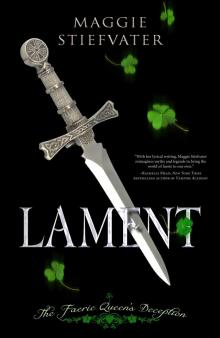 Lament: The Faerie Queens Deception
Lament: The Faerie Queens Deception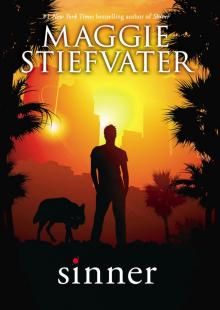 Sinner
Sinner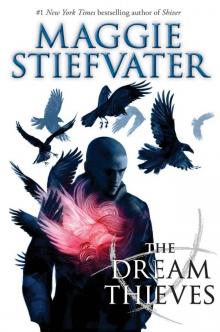 The Dream Thieves
The Dream Thieves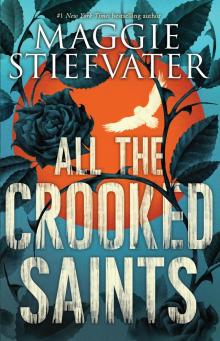 All the Crooked Saints
All the Crooked Saints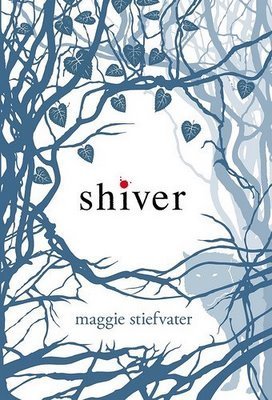 Shiver
Shiver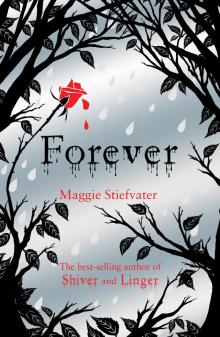 Forever
Forever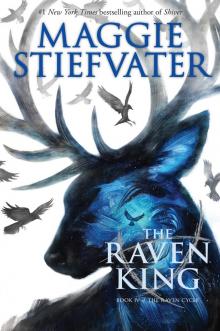 The Raven King
The Raven King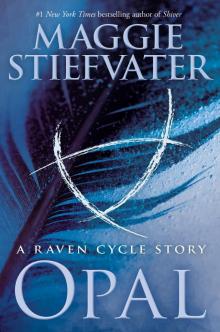 Opal
Opal Linger
Linger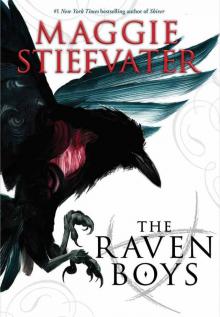 The Raven Boys
The Raven Boys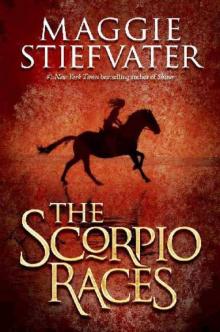 The Scorpio Races
The Scorpio Races Hunted
Hunted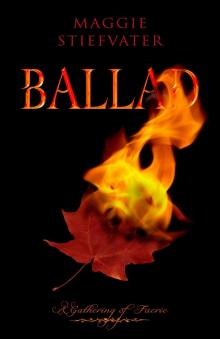 Ballad: A Gathering of Faerie
Ballad: A Gathering of Faerie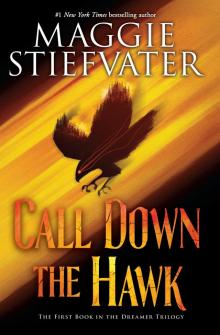 Call Down the Hawk
Call Down the Hawk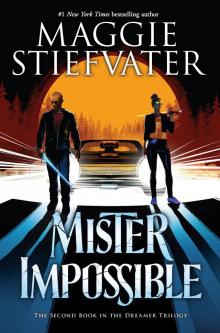 Mister Impossible
Mister Impossible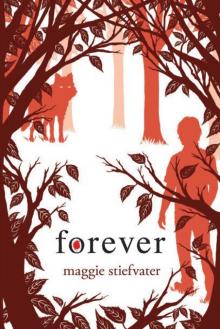 Wolves of Mercy Falls 03 - Forever
Wolves of Mercy Falls 03 - Forever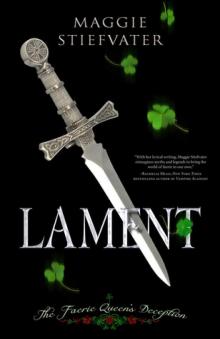 Lament
Lament![Maggie Stiefvater - [Wolves of Mercy Falls 02] Read online](http://i1.bookreadfree.com/i1/04/04/maggie_stiefvater_-_wolves_of_mercy_falls_02_preview.jpg) Maggie Stiefvater - [Wolves of Mercy Falls 02]
Maggie Stiefvater - [Wolves of Mercy Falls 02]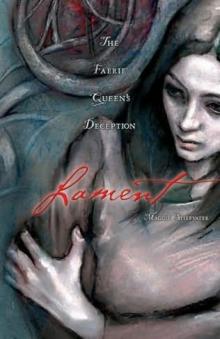 Lament: The Faerie Queen's Deception
Lament: The Faerie Queen's Deception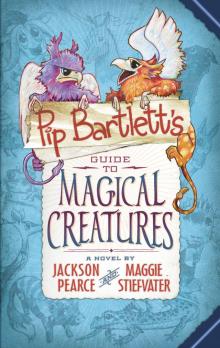 Pip Bartlett's Guide to Magical Creatures
Pip Bartlett's Guide to Magical Creatures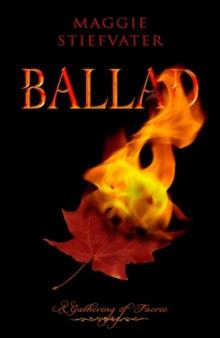 Ballad
Ballad